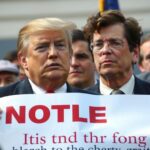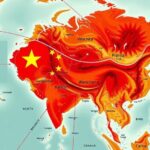Politics
APPLE, ARTIFICIAL INTELLIGENCE, ASIA, BEIJING, BIPARTISAN HOUSE SELECT COMMITTEE, CHINA, CHINESE COMMUNIST PARTY, COMMUNIST PARTY, GEOPOLITICS, JOHN MOOLEN, JOHN MOOLENAAR, KA, MEXICO, MICHIGAN, MOOLENA, NATIONAL SECURITY, NATIONAL SECURITY COUNCIL, NORTH AMERICA, TRUMP, U. S, US-CHINA RELATIONS, VENTURE CAPITAL, WALL STREET
Clara Montgomery
DeepSeek AI Launch Elicits National Security Alarm Among U.S. Officials
DeepSeek, a Chinese AI application, has raised national security concerns in the U.S. quickly becoming popular upon its launch. Officials are worried about data privacy risks, competition in AI, and possible censorship issues. Lawmakers call for stronger export controls to safeguard national interests amid ongoing tensions with China over technology access.
The introduction of DeepSeek, a Chinese AI application, has ignited significant concerns among U.S. officials regarding national security implications. Following its launch, DeepSeek quickly became the most downloaded app in the Apple store, leading to a sharp decline in the market value of Nvidia, highlighting potential competition in the AI space. President Trump described this as a “wake-up call” and announced that the National Security Council would review associated risks, emphasizing the need to maintain American dominance in AI.
Lawmakers have expressed apprehension about DeepSeek’s potential risk to U.S. national security. Representative John Moolenaar stated that the U.S. must prevent technologies influenced by the Chinese Communist Party from jeopardizing national interests. He called for stronger export controls on technologies vital for DeepSeek’s functioning, amidst increasing tensions between the U.S. and China over technology and trade.
Experts cautioned about the data privacy risks posed by DeepSeek. The application’s compliance with Chinese law allows the government broad access to user data. Ross Burley of the Centre for Information Resilience highlighted that widespread use of DeepSeek could lead to personal data being misappropriated by the Chinese authorities, potentially for disinformation or behavioral manipulation campaigns.
DeepSeek’s distinction from TikTok lies in its foundation as an open-source model, which raises fewer regulatory concerns than applications with centralized data handling. Nevertheless, it faces scrutiny due to its servers being located in China, raising questions about user data protection. Matt Sheehan noted that alternative platforms can offer similar functionalities without inherent data privacy risks.
Censorship concerns also accompany the use of DeepSeek outside China, as evidenced by its lack of search results pertaining to sensitive topics such as the Tiananmen Square protests. Burley urged Western governments to evaluate the implications of hosting such applications that may suppress information and propagate biased narratives, indicating a pressing need for regulatory intervention.
DeepSeek is a Chinese-developed AI application that has gained popularity in the U.S. amid rising national security concerns. Its rapid ascension on American mobile platforms has led to intense scrutiny from policymakers, particularly in light of trade tensions between the U.S. and China. Past regulatory efforts have targeted similar applications like TikTok, highlighting ongoing conflicts regarding technology ownership and control.
DeepSeek’s launch has prompted significant discussions on national security and data privacy. With U.S. officials and lawmakers expressing trepidation about the implications of a Chinese-owned AI tool, regulatory measures may soon emerge. The necessity for vigilance regarding data access, Chinese censorship, and potential risks to international relations has been underscored, indicating a complex future for such technologies in the U.S.
Original Source: www.cbsnews.com








Post Comment